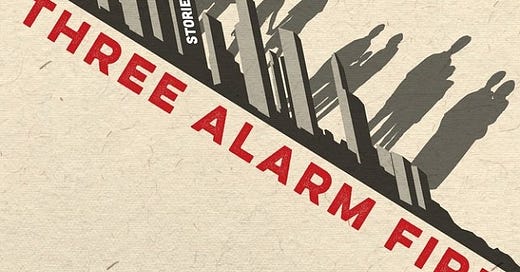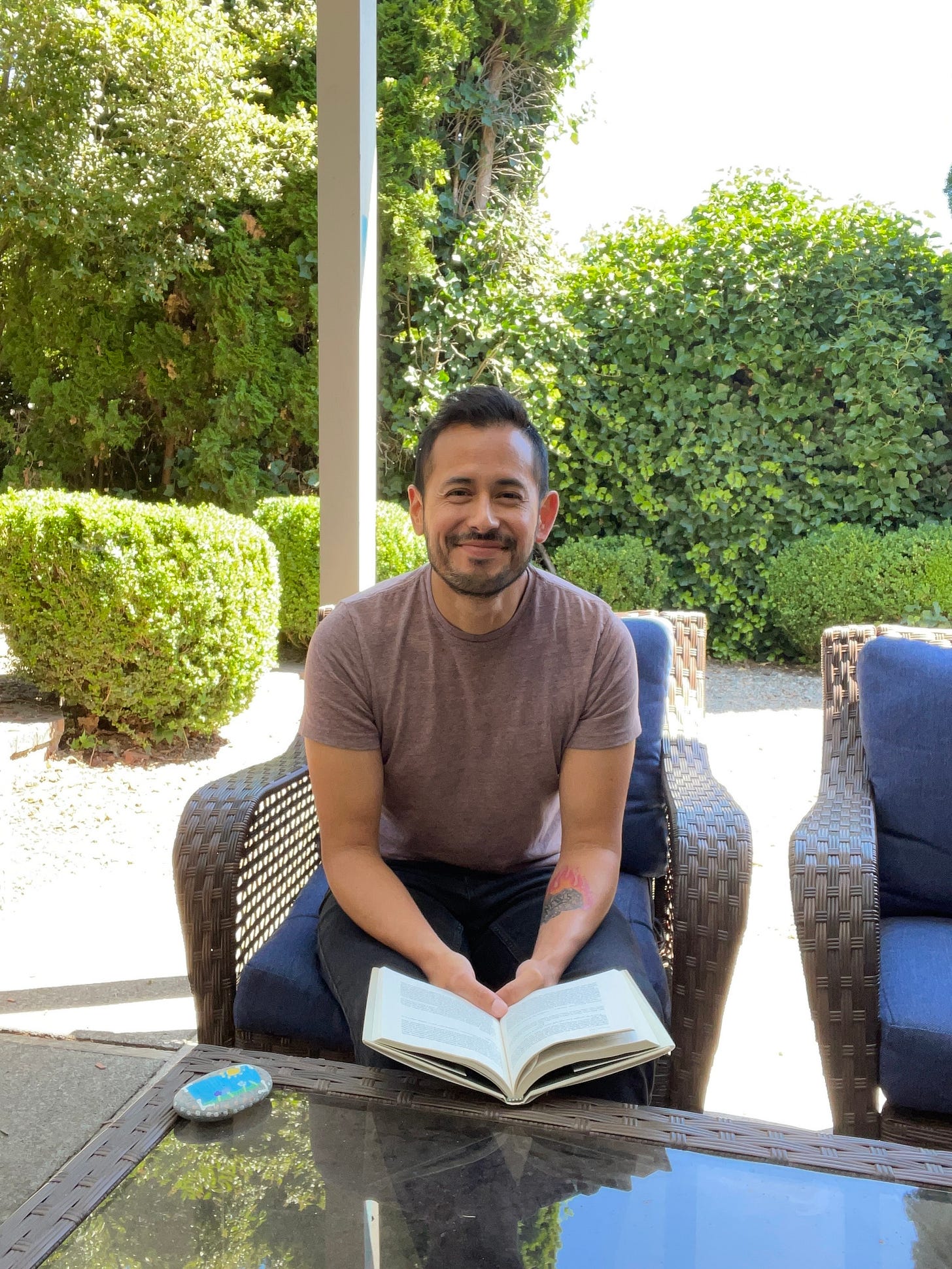#NuevasPáginas: The practice of fiction writing
With Juan Carlos Reyes author of 'Three Alarm Fire: Stories'
Hi Book Franz,
How are you holding up?
In case you missed my previous issues or are new here, before we jump into a new author interview/book feature, I want to check in on you. I also like to see this as my weekly reminder to check in with myself. So please feel free to reply out loud to yourself, reply in the comments, or you can always feel free to reply to this email, too. I truly believe community sustains, and I’m grateful to be able to be in community with you here.
I know I normally slide into your inbox earlier in the week. However, this week, I decided I wanted to take things slow. If something didn’t get done when it was supposed to get done, I allowed myself to feel okay about it. There’s so much going on that it’s easy to try and push through. But in the past, pushing through has led to a lot of burnout for me. So I hope to keep it slow this weekend too. My only goal is to spend more time reading Love by Toni Morrison and maybe start a book that I need to read for an event I’ll be moderating this month.
Whatever you do this weekend, I hope it’s something that helps you replenish the good energy that propels you forward.
In bookish love,
#NuevasPáginas is a space that aims to amplify and spotlight Hispanic/Latine/x authors with newly published books. The goal is to connect readers to their next favorite Hispanic/Latine/x authored book through a mini casual get-to-know-the-book-and-author interview. So please help me connect to more readers. So that together we can continue to build the love/support of Latine literature!
Without further ado…our special guest author for today’s Nuevas Pagina issue is…Juan Carlos Reyes author of Three Alarm Fire: Stories!
Could you tell me a bit about where this photo was taken? Is it special to your book in some way?
This photo was taken on my patio, where so many of the characters in my book, Three Alarm Fire, first took their breaths. When my mother and I first arrived to the United States, we shared a basement studio apartment, our entire lives in a single room and only a window in the kitchenette that opened to an outdoor stairwell leading into the building lobby. It was a cramped space, largely dark, and until I was ten years old, even the summer afternoons felt dim, compelling me throughout my childhood to be outside, to be always on the move, to be anywhere but indoors. So I don’t take this outdoor space for granted, especially the solitude it makes possible, and I have spent a lot of time out there reading, writing, or just listening for the ephemeral sounds of both the trees stirring and the traffic on our road whirring.
It's not lost on my either that so many of the character in the story collection, so many of the narrators and voices, are actually pressed for a space of their own, are near to boiling just to be able to call somewhere home, to be able to name a place that can be a respite from the figurative fires blazing around them. I was able to fully process the lives of these characters while sitting in my own space, a spot outside my house where I could breathe even as these characters tried to squeeze any amount of breathable air out of the world.
Tell me about your book without telling me about your book - share any literary inspirations behind your book! If there are none, the gap you wanted to fill in the literary canon with your book
If urgency met desperation and then birthed a child just as somebody lit a match. If Nicholson Baker and Salvador Plascencia hurled words at each other and then let remnants of their bantering rain onto a page. Like if somebody needed to scream to release all their anxiety but found themselves barely comfortable even whispering until their faces turned purple trying with all their power to keep their story to room temperature.
I’m not sure I wanted to fill a gap in the literary canon with Three Alarm Fire as much as follow a lineage, a tradition, long set by writers such as Ishmael Reed, Roberto Bolaño, and Clarice Lispector—in other words, step into the courage they embodied to challenge the bounds of storytelling and its abilities to incorporate the pains of an afflicted world. I’ve also enjoyed and been nourished by the works of Alejandro Zambra, Salvador Plascencia, Julian Delgado Lopera, Carribean Fragoza, Urayoán Noel, and other Latine writers, including more recently Ananda Lima, who’ve found joy and literary freedom in playful experimentation with points of view, style, and approaches to creative practice.
What are two central themes in your book that you connect with the most and why?
The central thread in Three Alarm Fire is precisely its title. A three-alarm fire is the first level in the multiple alarm fire designation, broadly defined as a severe fire that is hard to contain. But because it’s only the first category in that multiple alarm fire designation, we’re also able to put out a three-alarm fire before it becomes catastrophic, before the flames consume everything.
This story collection is broken up into sets of threes, and in each subsection of the book, there’s some kind of tragedy, some kind of fire, the characters are coping with and having to cope through. Gender violence. Encounters with authority. Guns. But there are also sections of the book in which characters navigate those very things that bring reprieve in a broken world. Love. Sex. Art. I love every subset of the book, and in the journey a reader takes reading these short fictions, they get to work their literary way from isolation into the realization (and complexities) of self and community.
If a book was home, where would your home be?
Three Alarm Fire would be fifteen-story apartment building in West New York, NJ. The town sits rights across the Hudson River from Manhattan, and it’s a soup of contradictions. Its density makes it difficult to navigate by car and difficult to pin down culturally. I grew up there in the 80s and 90s, and in so many ways the place feels the same: alert, opportunistic, tense. You can get what you need without ever really having to speak English, and the array of flags feels both pluralistic and nationalistic, every trouble and complication, racial and familial and regional, just an extension of every problem from every country those who live there immigrated from. The characters in Three Alarm Fire feel like the children and grandchildren of this place, at home nowhere because they had to sever their home just to scrape by, just to get out.
If your book was a famous musician who would it be?
I love this question because I’ve long thought of Three Alarm Fire as the literary version of The Clash’s London Calling. The double album, the band’s third album, is this meaty work that compiles all the band’s musical influences and experimentations and which arranges the tracks in such a way that feels like both a tonal progression and a choppy experience—this wonderful punk imperfection. Three Alarm Fire carries those same sensibilities, a compilation of all these different voices that can feel both jagged and logical, and the book reflects all that I find wonderful and powerful about storytelling and about the practice of fiction writing.
What comfort food could a reader pair with your book?
Empanadas, maybe. Bistec empanizado, absolutely. Platanos frito, for damn sure. But I can’t say why. They just all feel right for different portions of the book. But, as I write this, I guess it comes down to 1) the time and effort it takes to prepare these foods; 2) the variations of crispiness and chewiness and just straight dissolution in your mouth; and 3) the grease—these foods leave quite the visual impression.
In what ways has access (or little to no access) to Hispanic/Latinx/e literature defined you as a writer?
I had no access to Latine literature as a kid, but I didn’t really know what I was missing because I also wasn’t looking for it. I saw myself every day in the images and mannerisms of my mother, my grandmother, my aunts and my uncles. With the exception of some cousins who were born here, we were all immigrants, and we were all strange to this place, and even though we were all strange to each other, too, in our own ways, we were also at home with each other and in each other’s stories, even in the face of all the friction natural to every big extended family. It wasn’t until high school that my dad introduced me to the histories of the Americas, the literatures across the diasporas—the breadth of it all just overwhelmed me. And it wasn’t until college that I needed all those literatures to fill an emotional void that the traditional U.S. canon, as it had started to become concrete for me, just didn’t fill. I don’t think I can overstate how important it was for me to look for all these works and find them, which, of course, was never easy. But it mattered to have a reliable group of friends at the tail end of college and afterwards, these formative friendships that meant everything to me intellectually and socially. We’d trade jabs at each other with every book recommendation, trade sips of each other’s drinks after every random Spanish language play or movie or concert we’d go to, engage in deep conversation about the state of Latine culture in between every sweaty bout on a dance floor, even the dance spaces we had to make for ourselves. It was easy, of course, to explore Latine culture in New York in the early aughts, especially in that post-9/11 haze when for years nothing really felt certain or easy. There was so much being created. There was so much to be challenged by. I will always pair this ultimate access to, this wider discovery of, Latine literatures and culture with this time of my life. These texts and experiences met me in the span of a decade as the fullness of what I was going to decide for myself creatively started to come into full view.
Where can readers keep up with your work?
People can keep up with me on social media (@JCReyesian) where I post randomly about family, kids, travel, books, and friends in no coordinated way. And there’s my website www.jcreyeswriter.com, that I too occasionally redesign to keep pace with how I’m feeling. For a few years, my website resembled a random number generator where you’d only get one page at a time, no menu, and every click on the page would take you to some random page on the site. However, for the run-up to this book, I have made things much easier for everyone (which I’m sure my publisher is grateful for).
Thank you to Juan Carlos Reyes for taking the time to chat with me about his book! Please please make sure you purchase a copy (or request your local library carry a copy) #SupportLatinxLit!
Juan Carlos Reyes's stories, poems and essays have appeared in Ascentos Review, KGB Lit, and Hawai'i Review, among others. He is a 2018 Jack Straw Writers Fellow and is currently an Assistant Professor of creative writing at Seattle University. He is also the chief editor at Big Fiction magazine. He is the recipient of the Artist Trust 2018 LaSalle Storyteller Award in Fiction.
Synopsis for Three Alarm Fire: With a diverse set of characters and experiences, Juan Carlos Reyes's debut fiction collection examines the range of grief and healing we navigate as Americans. Reyes explores themes of immigration, identity, family legacy, sexuality, trauma, and what belonging means, as well as the cultural tensions between us that can be downright explosive.
By turns tragic and heartfelt, arresting and funny, Three Alarm Fire is a microcosm of modern life, and it introduces readers to an incisive new voice in contemporary fiction.











